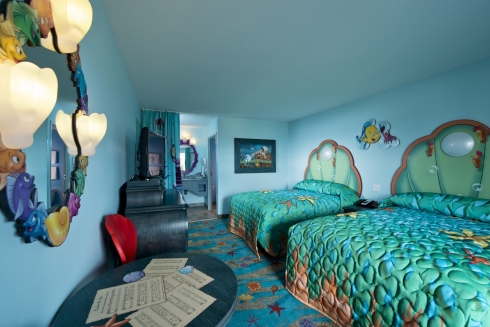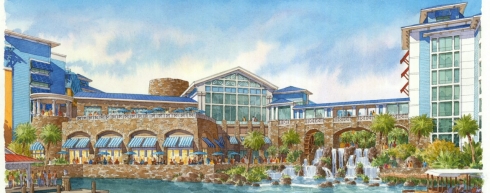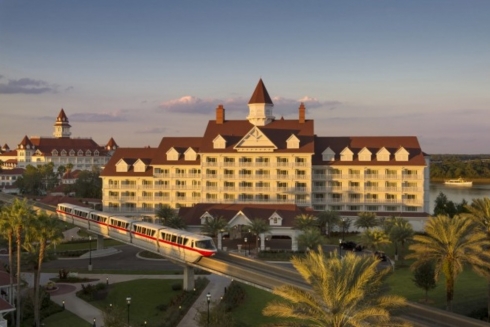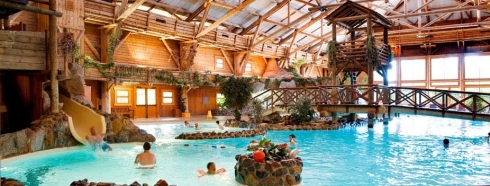
We have a mystery on our hands: is Disney in the midst of a hotel problem? Although Orlando’s hotel occupancy rate has been extremely healthy so far this year, there are repeated rumblings of Walt Disney World not faring anywhere near as well… which may or may not end up being a big deal, and which may or may not end up affecting Universal Orlando Resort to any great extent.
It’s actually a great deal to chew over, so, as usual, we’ve assembled some of the most insightful minds around:
- Len Testa – president of Touring Plans and co-author of The Unofficial Guide to Walt Disney World.
- Don Munsil – co-editor-in-chief of MouseSavers and the MouseSavers Newsletter.
- Nick Sim – editor-in-chief of Theme Park Tourist and author of Universal Orlando: The Unofficial Story.
This crack team will use everything from insider knowledge to parsing Disney’s job openings to on-site anecdotes to the latest in economic theory to try and get to the bottom of the case.

Marc N. Kleinhenz, freelancer:
I’ve recently come across a few stories that have claimed Walt Disney World’s hotel occupancy rate is the lowest it’s been since the period immediately following 9/11.
Is this true? If so, why? What does Disney need to be doing to fill more of its tens of thousands of hotel rooms, regardless of the exact current occupancy rate? Did the company attempt to open value hotels way too late in the game?
And, finally, seeing as how Universal just recently announced its fifth property – Sapphire Falls Resort – I suppose we can't go without comparing/contrasting the approaches to on-site accommodations that the two rivals are taking.
1. Disney cares more about price messaging than (short-term) profitability

Don Munsil, MouseSavers co-editor-in-chief:
Lots of questions and a big topic. Some random thoughts:
We have also heard the rumors that overall occupancy is somewhat below where Disney would prefer, primarily at their deluxe resorts. We have no idea if those rumors are correct, but you can see some small indications of where they have occupancy by looking at what discounts they're offering and which resorts and rooms are blacked out.
The Little Mermaid (i.e., standard) rooms at Art of Animation are routinely blacked out from getting discounts, plus occasionally one or more All-Stars and portions of Port Orleans. In the deluxe villa category, you often see Bay Lake and Villas at Grand Floridian blacked out, and room availability at Animal Kingdom Villas is spotty. But I can't recall offhand seeing any regular deluxe resort being blacked out from discounts, and, of course, the deluxes get the largest percentage discounts.
That said, there are definitely periods where there are no discounts available, even for deluxe resorts, or very few rooms available at a discount. When there aren't any discounts, that says Disney is satisfied with their overall occupancy during those periods and is actually getting the rack rate. This is pretty impressive, really: Disney is actually able to achieve good occupancy rates for at least part of the year at very high rates. Really, most hoteliers in the area would love to have Disney's problems. And, frankly, even if you look at their discounted rates, they're well above what offsite hotels are getting.
Disney is, if nothing else, pretty obsessive about maximizing long-term revenue. Even if occupancy is lower for Deluxes, their margins per-room are extremely high, and my guess is that they feel, in the aggregate, they're setting a profit-maximizing price.
Part of the calculation there, though, is "price integrity." Disney has always felt that pricing sends a message, and when prices get too low, you're sending the message that your stuff isn't that great. Disney is willing to take lower short-term profit in order to keep sending the message that their products are worth the big bucks. They do it with their DVDs, toys, and other merchandise – and hotels, as well. The thinking is that if guests know that the prices always stay high, they won't wait for a sale to come along.
2. Disney’s not very hungry right now
Bottom line for me, though, is that Disney is not acting very hungry right now. We're seeing shorter discount periods, less availability of discounts, and lower discount rates than we saw a few years ago. Disney has stopped offering the AAA discount, which used to be available almost year-round on every room. That's not something you do if you're worried about occupancy.
When you look at Disney's expansion and construction over the last 10 years, you certainly get the impression that DVC is a big hit with Disney, and they've added value rooms, but there have been no new deluxe or moderate rooms added. To me, that says they're okay with the current portfolio of deluxe and moderate rooms.
And given the higher profitability of DVC, I would guess they're going to focus their deluxe efforts on DVC expansion, either via new resorts or room conversions, a la the Polynesian Village Resort.

Nick Sim, Theme Park Tourist editor-in-chief:
I'm not going to pretend to have insider knowledge on Disney's hotel occupancy rates, but I think Don's perception of the situation is almost certainly the correct one. If Disney is not offering significant discounts (or any at all) for substantial periods, then that certainly suggests that:
(a) It's comfortable that (even potentially without 100% occupancy) it's got its pricing right for those periods, and/or
(b) It doesn't want to devalue its brand by constantly offering heavy discounts.
That's been a big problem over here in the UK for some of our major hotel and restaurant chains (particularly Pizza Express), who offered more-or-less constant discounts during the "Great Recession" and are now pretty much stuck with offering them on a permanent basis. The same can be said of Merlin Entertainments' theme parks over here – two-for-one ticket vouchers are regarded as standard now by most visitors, and are widely available on cereal boxes and in newspapers. I can't see Disney viewing that as an attractive long-term proposition, either for its park or for its hotels.
In terms of maintaining or boosting its occupancy rates, Disney seems to be heading in the direction that Universal has always taken in the past – offering significant perks to its on-site guests. Although much of MyMagic+ is now available to off-site guests, Disney's own guests still have the advantage of booking FastPass+ slots further in advance. That may not be quite as extreme as Universal's unlimited Express Passes for guests at its top-end hotels, but it's a step towards differentiating the experiences that on- and off-site guests can look forward to, and driving more people to pay extra to stay in a Disney hotel.
As for comparing Disney's strategy to Universal's, I just don't think the two are directly comparable right now. Universal Orlando is in the same position that Disney was in back in the 1980s when Michael Eisner took over: it has some very popular theme parks that are, really, totally underserved by a relatively small number of hotel rooms. It can afford to throw up new ones secure in the knowledge that legions of Harry Potter fans will soon fill them, just as Disney knew in the 1980s that there was demand for on-site hotel rooms well beyond what it was currently providing.
Can you say the same of Walt Disney World now, in its much more mature state? Probably not. And the same may be true of Universal Orlando a decade or two down the line.
3. The deluxe resorts bring in more money regardless of occupancy

Don Munsil, MouseSavers co-editor-in-chief:
I just thought of a potentially relevant anecdote from a recent trip. We were walking around one of the value resorts accompanied by a cast member who was showing us around. We remarked on how popular the resort was, and he said, obviously proud, "Oh, yes – we have periods where we're booked up solid and the Grand Floridian is at, like, 50% occupancy."
Obviously, this is just gossip and isn't any kind of hard data, but it suggests that people on the inside believe the value resorts are generally more full than the deluxe resorts.
As for Universal's strategy, they seem committed to having mostly deluxe properties, given their announcement of a fourth deluxe to go in between Cabana Bay Beach Resort and Royal Pacific Resort. Once they've built that, it seems like they don't have a ton of land left – at least, not near the parks.
It's worth noting that Disney World had exclusively deluxe hotels for its first 17 years of operation. Disney didn't build their first moderate until 1988, and the first value came in 1994. It may well be that when you have only a few hotels, skewing deluxe makes more sense; try to capture the luxury market first, as they're the ones with big bucks to spend. Long-term, the mass-market is where the money is, but first you need to build out infrastructure and staff and create demand.
One thing about deluxe versus value is that a deluxe resort has so much higher profit margin per guest that a deluxe can probably make some decent money at 50% occupancy, whereas a value might be in trouble.
If you put all that together, it makes some sense that Disney wouldn't be too aggressive about reducing deluxe price points to fill the resort; the deluxes are no longer their largest source of hotel revenue.
But to return to the point about price integrity, they are, in essence, a way of advertising to the world that a trip to Disney is worth big bucks, and providing a handy price validator and point of comparison for their other resorts (and for DVC). People think, "Wow – people are willing to spend $500 a night to stay at the Grand Floridian? A $230-per-night room at the Caribbean Beach seems pretty reasonable! And spending $25,000 on a DVC membership seems like a financially sound investment!"

Nick Sim, Theme Park Tourist editor-in-chief:
I think Don is definitely right about Universal focusing primarily on luxury hotels to date because of its smaller overall size.
I wonder if demographics also play a part. I'm heading to Disneyland Paris shortly with my wife, parents, and 21-month-old son, and we found that the only practical on-site accommodation option was actually the cheapest (the Davy Crockett Ranch). It's the only resort that's set up to self-cater for a young child, with fridges, microwaves, etc. in the rooms – the rest of the hotels at DLP (all of which skew towards the luxury end of the market) just don't really have those facilities. We were told we "might" be able to get someone in the restaurant to microwave some food for us at the Hotel Cheyenne, which wasn't too reassuring.
We went the same route on our last Florida trip – we stayed in a suite at the Art of Animation Resort, not because it was cheaper than moderate/deluxe properties, but because it was more practical for a family with a very small child. Given that Universal's target audience is a little older than Disney's, maybe that's also reflected in its hotel lineup.
But I think that will change in the long-term if Universal decides to really compete in the family market, which will require new attractions as well as new hotels.




Add new comment